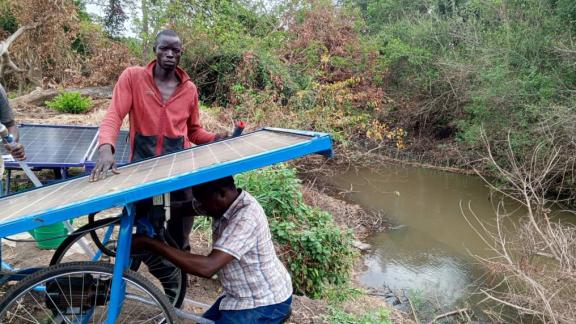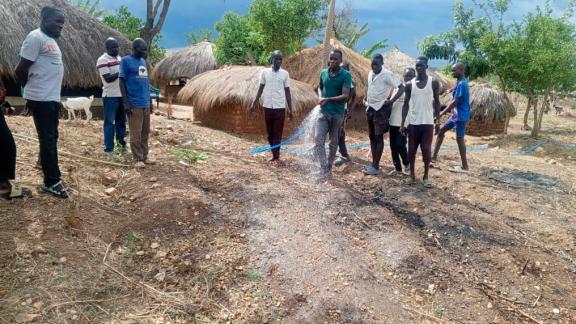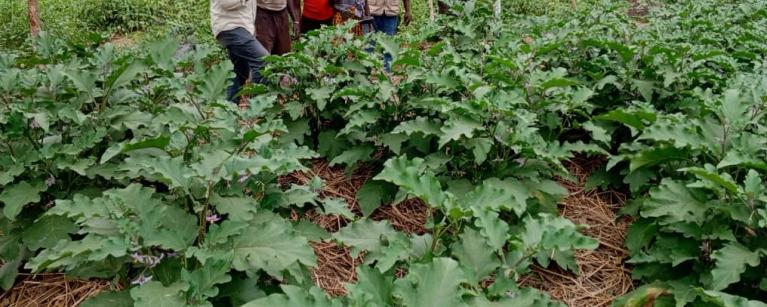Climate change disproportionately affects rural farmers, by reducing crop yields, and increasing vulnerability to extreme weather events, and potential for food insecurity and income loss due to reliance on rain-fed agriculture.
This problem is further exacerbated among the refugees who have limited or no access to land for farming. cultivate crops. The recent reduction in food assistance by the World Food Programme (WFP) further compounds the issue.
In Terego District, Oxfam and the Uganda Refugee and Disaster Management Council (URDMC) are strengthening the resilience of both refugees and host communities against the impacts of climate change.
Through the livelihood component of the Humanitarian, Development and Peace initiative for Crisis-affected population in Uganda (HDP) Project, URDMC has trained refugee and host communities on sustainable farming ways, such as climate-smart agriculture, which is significant in the West Nile region, which receives little rainfall.
Funded by the Danish Development Agency (DANIDA) through Oxfam Denmark, the initiative has seen Oxfam and URDMC also distribute farm inputs, including crop seeds, farming tools and irrigation kits, to ensure year-round crop production.
James Adrabo’s group – Nyola Farmer Group, formed in 2024 in Terego District, Imvepi Refugee Settlement, Zone 2, is one of the 70 farmer groups that received the training under the project.

The community members learned about the project during a sensitisation meeting from the community leaders, where they were guided on how to form self-help groups, which inspired them to create their group.
To ensure success, and inclusion, URDMC also trained them in the Gender Action Learning System (GALS) methodology and introduced the Village Savings and Loan Associations (VSLA) methodology as a way of improving saving and investment culture and empowering individuals and households to work together.
Oxfam and URDMC work with 70 farmer groups by providing seeds, farm tools and climate-smart agriculture training. This project also aims to create employment opportunities for youth and women through various income-generating activities, such as the formation of VSLAs, poultry rearing, and piggery, all aimed at enhancing food and income security for both refugee and host communities.
Adrado’s group received farm tools and crop seeds such as eggplants, tomatoes, onions, and cabbages. They were also trained in climate-smart agriculture and solar pump irrigation to enhance their crop production using sustainable energy sources. Additionally, they were trained on how to legally access land from the host community to support agricultural productivity.
“Our livelihoods depended heavily on food aid from the WFP and occasional gifts from friends. We would sell some of the food to purchase necessities like sugar and exchange for other dietary needs”
The reduction in food rations and the move to prioritization due to funding constraints have put a strain on cash and food assistance for refugees.
Through the livelihood component of the HDP project, farmer groups like Adrabo's have received support that has enhanced their livelihoods. By collaborating with local communities, refugees were able to cultivate land without the need to rent it, instead, they were given land at no cost as part of their groups.
“Our breakthrough came when we harvested a bumper crop of tomatoes, which we sold for UGX 960,000. This success enabled us to hire more land near a permanent water source, allowing the group to cultivate during the dry season using irrigation”

Adrabo, who is a refugee from South Sudan, is happy that they are no longer relying on cash and food assistance. ‘’We have achieved self-sufficiency and established various individual businesses within our group. We also participate in VSLAs, where we save weekly,’’ he adds.
As Adrabo James put it, “We can now afford our basic needs with ease.”
Their group has also established a Village Savings and Loan Association (VSLA), enabling members to access loans without needing collateral. Additionally, the GALS methodology has empowered women to take on leadership roles within the group, something that was rare in the past when many women were hesitant to lead.

Nyola Farmer Group from Imvepi Refugee Settlement, Zone 2, showcasing how the irrigation kits they received under this project work
70 groups of VSLAs have been established to promote savings and access to credit for the communities. Many refugees participate in VSLAs, which provide a safe space to save money, access loans, and invest in their businesses or agricultural activities.
Although they have made significant strides, they still need access to more land for agriculture, as well as support in financial literacy, marketing, and stronger linkages to input dealers and produce buyers.
With funding from DANIDA through Oxfam Denmark, Oxfam in Uganda is implementing Humanitarian, Development and Peace initiative for Crisis affected population in Uganda (HDP) Project in partnership with four Refugee Led Organizations, one national Community Based Organization and four NGOs to achieve a peaceful, gender and climate-just society that upholds all human rights through the promotion of peaceful co-existence, delivery of livelihood and food security, education, climate change and economic and social justice interventions in Southwest (EACOP district ) and West Nile districts of Yumbe, Madi Okollo, and Terego.
